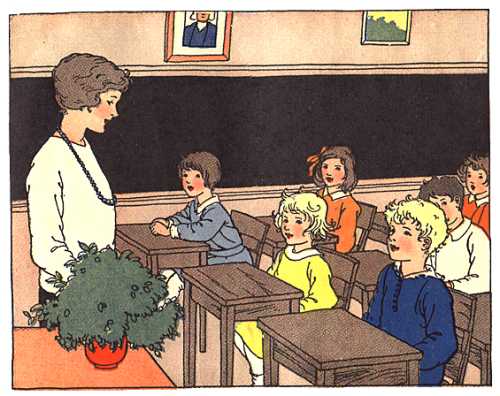- There’s new blogging on the fate of pre-1985 children’s books from book restorer and conservator Javamom, Jane Badger (iBookNet, U.K.), Dillon Hillas, Wellspring Creations, and Small-Leaved Shamrock.
 Deputy Headmistress continues to blog the book angle intensively, as does Valerie Jacobsen (read this post in particular). Note also the comment from Nancy Welliver on her February 11 post: “We are a used curriculum and book seller. We have removed 3,500 books from our website. … until recently publishers did not put printing dates in books, only copyright dates. So a book that is copyrighted 1976 may have been printed in 1988 and therefore legal to sell, So how do we know which are printed before and which after 1985? So we have removed all books for children with copyright date 1985 and before.” There’s also a page at cpsia-central (the Ning group) on books and libraries.
Deputy Headmistress continues to blog the book angle intensively, as does Valerie Jacobsen (read this post in particular). Note also the comment from Nancy Welliver on her February 11 post: “We are a used curriculum and book seller. We have removed 3,500 books from our website. … until recently publishers did not put printing dates in books, only copyright dates. So a book that is copyrighted 1976 may have been printed in 1988 and therefore legal to sell, So how do we know which are printed before and which after 1985? So we have removed all books for children with copyright date 1985 and before.” There’s also a page at cpsia-central (the Ning group) on books and libraries. - The law is also having a major impact on sellers of new children’s books, given that the only newer books presumed safe for legal purposes without testing are completely plain books with no embellishments or non-paper features. Don’t miss the letter at Wellspring Creations from “Jackie”, who identifies herself as the manager of the children’s book section at a Half Price Books store, part of a large chain that sells publisher’s remainders and overstocks as well as used books:
I have experienced the severity of this issue first-hand. … Initially, it didn’t seem like this would have much of an impact on the kids section, but as I went through my section pulling everything that was potentially harmful, I soon realized that this was going to decimate my section. My display tables were over halfway empty, and there were half-empty or completely empty shelves all throughout the section. … The kids cooking shelf went from being packed full to only having half a dozen books left, all because most of the cookbooks were spiral-bound with metal. …
The day that I had to get rid of all those books was one of the roughest days I’ve ever had at work. The kids section is my pride and joy, my baby, and I had to not only watch it get torn apart- I had to do it myself. It was heartbreaking.
The happy ending, if you want to call it that, is that eventually many or most of the new books are likely to return to the shelves after the chain puts them through testing — though it’s more likely to take such a step for a mass-selling branded item piled high on display tables than for a specialty cookbook expected to sell only in the dozens of copies. Go read the whole thing.
- Community Homestead is a center for developmentally disabled adults in rural Wisconsin that has sold residents’ handcraft toys. Its CPSIA story is here.
- Dust-ups in comments sections are not my thing, but some people enjoy them, and they keep breaking out on the occasions when someone still attempts an aggressive defense of this bad law. Thus when the Chicago Daily Herald printed a letter from Alexandra Lozanoff of the Illinois Public Interest Research Group (PIRG) yesterday rhapsodizing about the law, numerous commenters jumped in to express rather sharp disagreement. A state legislator in Orangeburg, South Carolina put her name to a piece in the local paper attacking Sen. Jim DeMint for sponsoring CPSIA reform, provoking dozens of comments, most taking issue. The Natural Resources Defense Council, which is invested in defending CPSIA in part because of the law’s phthalates ban, ran an ill-informed piece pretentiously titled “The Artisan Toymaker’s CPSIA Exemption Guide” and was promptly spanked by knowledgeable commenters, a fate that also befell the left-leaning crew at Moms Rising. The lengthy comments section on John Holbo’s thoughtful followup post at Crooked Timber presented the spectacle of one agitated and flailing defender of the law pretty much surrounded by people trying to talk sense into him. Someone adopting the monicker “Civil Justice” wandered into the Etsy forums to push Lawsuit Lobby views and was not met with pleasure by the assembled crafters, an episode which may be related to the one already told about how the misnamed Center for Justice and Democracy, a group with views antipodal to our own, suggested that we all were insensitive to children’s health and then refused to let any letters from critics through moderation, claiming to feel threatened by the letters’ tone (examples of the sorts of letter CJD found too intimidating in tone to run: Mark Riffey, Olivia @ BabyCandyStore). Some other previously linked comments discussions: The Pump Handle (profoundly misguided contributor corrected by Deputy Headmistress, Kathleen Fasanella, etc.), Consumer Reports, Greco Woodcrafting (Public Citizen’s David Arkush vs. the world), and, of course, Justinian Lane.
- Even a casual acquaintance with CPSIA blogging is enough to show that homeschooling parents have taken an extraordinary role in leading the resistance to the law. Bloggers like CalifMom have predicted that the law will have numerous harmful impacts on homeschoolers, and homeschool curriculum suppliers such as Hands and Hearts History Discovery Kits and Hope Chest Legacy have already closed down because of the impracticability of compliance. So it’s unfortunate that the Home School Legal Defense Association (HSLDA) seems to have so little clue what’s going on.

